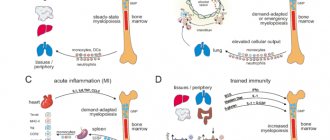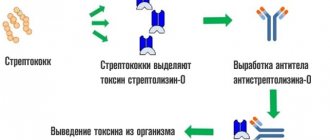What is leptin?
Leptin is a hormone produced by fat cells. The more fat there is in the body, the more leptin is produced (,). With its help, fat cells “communicate” with the brain.
Leptin tells you how much energy is stored in the body. When there is a lot of it, the brain understands that there is enough fat (energy) in the body. As a result, there is no severe hunger, and the metabolic rate is at a good level ().
When leptin is low, it is a signal that fat reserves (energy) are low, which means hunger and possible death. As a result, metabolism decreases and hunger increases.
Thus, the main role of leptin is the long-term management of energy balance (). It helps support the body during times of hunger by signaling the brain to turn on the appetite and reduce metabolism. It also protects against overeating, “turning off” hunger ().
Developing a healthy routine
Leptin increases due to lack of sleep. Therefore, you must get enough sleep. 8-hour sleep is not a whim, but an urgent necessity. And, at a minimum, it is a fight against stress. And stress slows down an already disturbed metabolism.
Make sure you get good sleep. An hour before going to bed, put away your gadgets so that no electronic screen looms before your eyes - this excites the brain and prevents it from fully adjusting to sleep. Before going to bed, ventilate the room properly or even sleep with the window open. Sleep on an orthopedic pillow and a hard mattress. And yes, the regime means going to bed and getting up at the same time. And on weekends, yes. The body will thank you!
Leptin resistance
Obese people have high levels of leptin () Logically, the brain should know that there is more than enough energy stored in the body, but sometimes the brain's sensitivity to leptin is impaired. This condition is called leptin resistance and is now considered the main biological cause of obesity ().
When the brain loses sensitivity to leptin, the control of energy balance is disrupted. There are a lot of fat reserves in the body, a lot of leptin is also produced, but the brain does not see it. Leptin resistance is when your body thinks you're starving (even though you're not) and adjusts your eating behavior and metabolism accordingly (11, , , ):
- A person may feel hungry all the time; food does not satisfy him, which is why he eats much more than normal.
- Activity decreases, calorie expenditure at rest decreases, and metabolism decreases.
A person eats too much, moves little, becomes lethargic, his metabolism and the activity of the thyroid gland are reduced, excess weight up to obesity is the result.
It's a vicious circle:
- He eats more and stores more fat.
- More body fat means more leptin is released.
- High levels of leptin cause the brain to reduce the sensitivity of its receptors to it.
- The brain stops receiving leptin and thinks that hunger has come and forces you to eat more and spend less.
- You eat more, spend less and accumulate even more fat.
- Even more leptin. And so on.
Let's start with nutrition
This is the main way to lower leptin levels and restore the sensitivity of the hypothalamus to it. Where this hormone is found is in fat. More precisely, it is synthesized in it. So, let’s give the fat a fight:
- We eat fractionally: often and in small portions. We eat our last meal not before 6, but 3 hours before bedtime. Not later than.
- Caloric intake is strictly calculated; we consume no more than 1500-2000 kcal for the whole day. More precisely, you can calculate your norm using an online calculator. At the same time, we allocate only 1/5 of our daily calories for dinner.
- Salt and sugar are enemies number 1.
- Seasonings and spices - a minimum.
- Vegetables are the basis of the diet.
- Cereals are the same.
- Reducing fat. What foods contain a lot of fat: fatty meats, fatty dairy products (sour cream, butter, cream), confectionery products. It’s already clear about fast food and trans fats, I think.
- But we don’t exclude fats completely. We use cold vegetable oils, nuts, fish, lean meat, and low-fat milk.
- We limit carbohydrates. We minimize simple (fast) carbohydrates. We don’t go heavy on sweet fruits and berries, we remove all flour and sweets.
What Causes Leptin Resistance?
Inflammatory processes
Inflammation in the body can be asymptomatic. In obese people, similar processes can occur in the subcutaneous fat tissue with severe overcrowding of fat cells or in the intestines due to a passion for the “Western” diet, rich in refined, processed foods.
Immune cells called macrophages arrive at the site of inflammation and release inflammatory substances, some of which interfere with leptin's ability to work.
What to do:
- Increase omega-3 acids in food (fatty fish, flax, fish oil supplements).
- Bioflavonoids and carotenoids also show anti-inflammatory properties. They are rich in ginger, cherries, blueberries, currants, chokeberries and other dark berries, pomegranates.
- Decreased insulin levels (more on that below).
Fast food
Fast food and a Western diet with a lot of processed foods can also cause leptin resistance. The main culprit is thought to be fructose, which is widely available as an additive in foods and as a constituent of sugar ().
What to do:
- Avoid processed food ().
- Eat soluble fiber ().
Chronic stress
Chronically elevated stress hormone cortisol reduces the sensitivity of brain receptors to leptin.
Insulin insensitivity
When a lot of carbohydrates enter the body, a lot of insulin is released to remove glucose from the blood. If there is chronically too much insulin, cells lose sensitivity to it. Under these conditions, unused glucose is converted into fatty acids, which interferes with the transport of leptin to the brain ().
What to do:
- Strength training helps restore insulin sensitivity.
- Limit simple carbohydrates in your diet.
Overweight and obesity
The more fat you have in your body, the more leptin is produced. If there is too much leptin, the brain reduces the number of leptin receptors and its sensitivity to it decreases. So it's a vicious cycle: more fat = more leptin = more leptin resistance = more body fat.
What to do:
- Lose weight through proper nutrition and physical activity (,).
Genetics
Sometimes there is a genetically impaired sensitivity of the brain receptors to leptin or mutations in the structure of leptin itself, which prevent the brain from seeing it. It is believed that up to 20% of obese people have these problems.
Gerlin as a “hunger hormone”
As a “hunger hormone,” ghrelin is produced when the stomach is empty. “There’s nothing in your stomach!” – this signal is given by the body by increasing the level of ghrelin and the person has a desire to “throw something into the stomach.” To prevent our appetite from becoming ravenous, the concentration of ghrelin should not increase sharply. A relatively even level of ghrelin ensures frequent split meals in small portions due to the constant fullness of the stomach, or one of the bariatric surgery techniques is the installation of an intragastric balloon. More aggressive bariatric surgery techniques, such as sleeve gastrectomy or biliopancreatic bypass, also lead to a persistent decrease in ghrelin levels, but unlike the intragastric balloon, they are not reversible .
Lose weight for your health!
What to do?
The best way to find out if you have leptin resistance is to know your body fat percentage. If you have a high percentage of fat, which indicates obesity, if you have a lot of excess weight especially in the abdominal area, there is a possibility.
Also, for the primary diagnosis of obesity, body mass index (BMI - body mass index) is used. It can be calculated using the formula:
BMI = body weight in kg: (height in sq.m.)
Example: 90 kg: (1.64 x 1.64) = 33.4
The good news is that leptin resistance is reversible in most cases. The bad news is that there is no easy way to do this yet, and there is no drug yet that can improve leptin sensitivity. For now, those who are losing weight have in their arsenal familiar tips for changing their lifestyle - a healthy diet, calorie control, strength training and increasing daily household activity.
Why is obesity dangerous?
The development of obesity is accompanied by a high risk of:
- cardiovascular pathologies (atherosclerotic vascular lesions, strokes, myocardial infarction, coronary heart disease, angina pectoris, arrhythmias, etc.);
- arterial hypertension;
- osteoporosis (due to increased load on bone tissue);
- osteochondrosis (due to increased load on cartilage tissue);
- cholelithiasis;
- diabetes mellitus;
- ovarian dysfunction in women, etc.
Sources[edit | edit code]
- Dedov I. I., Melnichenko G. A., Romantsova T. I. Pathogenetic aspects of obesity // Obesity and metabolism. – 2004. – No. 1.
- Filchenkov A. A., Zalessky V. N. Leptin, adipocytes and body obesity // Russian Biotherapeutic Journal. – 2007. – T. 6. – No. 3. – pp. 30-37.
- Skibchik V.A., Skibchik Ya.V. "The problem of leptinemia in cardiovascular diseases." //"Ukrainian medical chapel". 2007. No. 11/12. — p.45-51.
- Romantsova T.I., Volkova G.E. Leptin and ghrelin: antagonism and interaction in the regulation of energy metabolism // Obesity and Metabolism. – 2005. – No. 2.
- Kucher A. G. et al. Leptin is a new hormone of adipose tissue: significance in the development of obesity, pathology of the cardiovascular system and kidneys // Nephrology. – 2005. – T. 9. – No. 1. – pp. 9-19.
- https://www.t-nation.com/diet-fat-loss/30-seconds-to-leanness/print
- https://www.dissercat.com/content/kliniko-pathogeneticheskoe-znachenie-opredeleniya-urovnya-leptina-v-syvorotke-krovi-bolnykh-o
- Mark AL et al. Selective leptin resistance: a new concept in leptin physiology with cardiovascular implications //Journal of hypertension. – 2002. – T. 20. – No. 7. – pp. 1245-1250.
- Podzolkov V.I., Bragina A.E., Rodionova Yu.N. GENDER FEATURES OF MICROALBUMINURIA AND ITS RELATIONSHIP WITH INTRARENAL HEMODYNAMICS AND LEPTINA LEVELS IN PATIENTS WITH ARTERIAL HYPERTENSION // Rational pharmacotherapy in cardiology. – 2012. – T. 8. – No. 1.
- Saginova E. A. et al. Formation of kidney damage in obese patients // Therapeutic archive. – 2006. – T. 78. – No. 5. – pp. 36-41
- https://www.biochemmack.ru/catalog/element/14162/40500/
- https://www.analizmarket.ru/tests/id/2991/
- https://umed.in.ua/99-0005/99-0005-leptin.shtml
Fat, great and terrible
This opus launched a worldwide “anti-fat” campaign, which led to an almost panicky fear of any lipids in food. Surprisingly, instead of getting healthier, people began to get sick even more often, gain weight even more intensely, and the lower age limit for obese patients began to rapidly drop: by the early 90s, it began to be diagnosed even in infants.
Having sounded the alarm, experts began to critically reconsider the sources of dietary postulates - it soon became clear that not only were a lot of mistakes made in Keys’s research, he also simply dismissed those countries that did not fit into his “anti-fat thesis.”
So gradually fats received dietary indulgence (and sugars and simple carbohydrates - on the contrary), but the problem of obesity still needed to be solved: maintaining an active lifestyle and a balanced diet did not help everyone.
In 1994, leptin was first isolated, which changed the scientific community’s understanding of fat mass in the human body. For a long time it was believed that it was inert - it lay under the skin and around the internal organs and waited until needed if the body suddenly began to starve.
It turned out that this is not at all true - fatty tissue has hormonal activity and not only affects the functioning of the endocrine system, but also produces hormones itself - leptin, for example.










